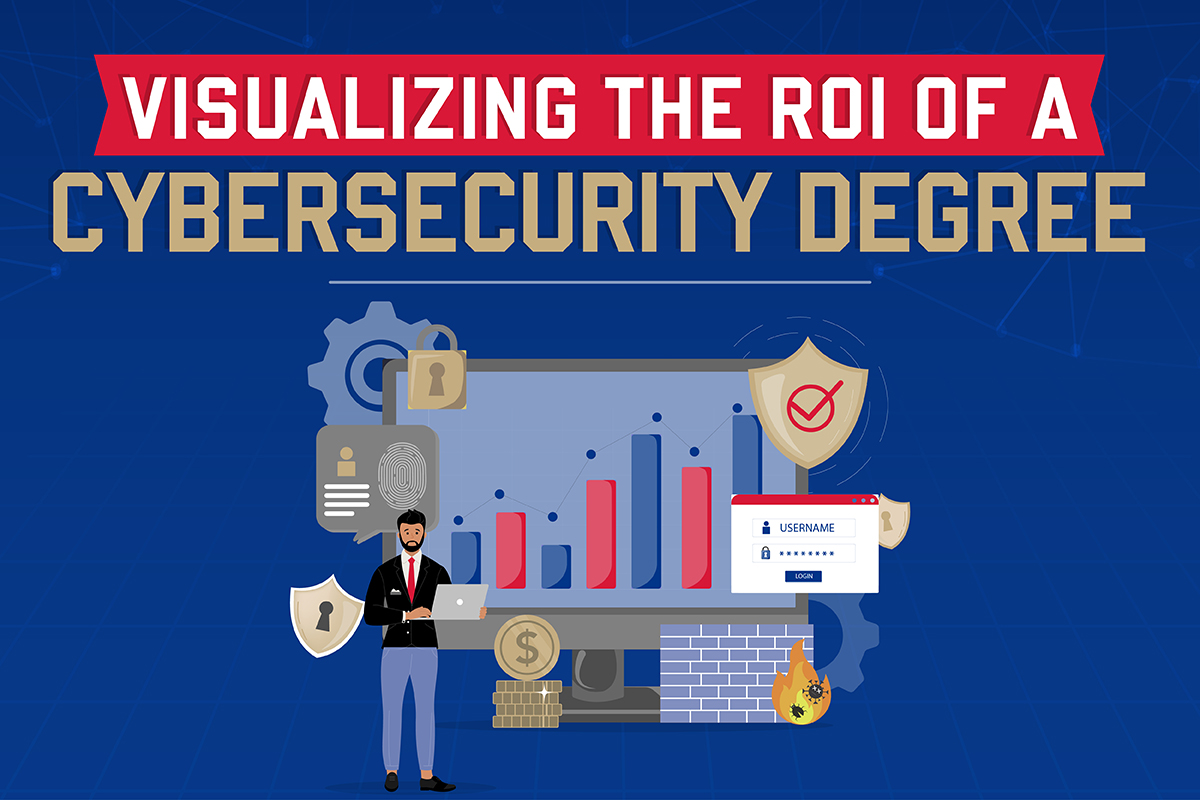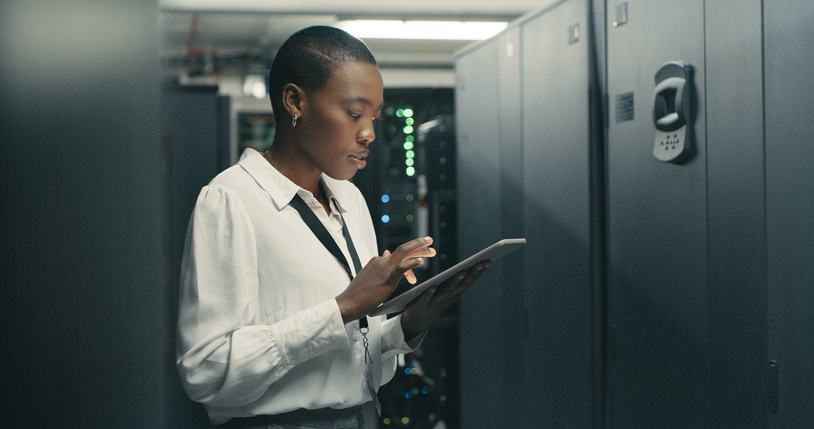Why Is Cybersecurity Important?
Written by:
University of Tulsa
• Dec 8, 2023

Our data and digital devices are more vulnerable than ever to cybercrime due to the vast amount of sensitive information stored digitally on networked systems and the connected devices that make up the Internet of Things (IoT). Every new piece of digital data and new connected system represents a point of vulnerability cybercriminals can target. Nothing is off limits, and the results can be harmful to people and businesses alike.
People may think hacking is a rare occurrence, but there are thousands of cybercriminals with knowledge and resources rivaling those of information technology companies — and hundreds of thousands of organizations without the resources to defend against them. According to the International Information System Security Certification Consortium (ISC2), the global gap between cybersecurity workers needed and the number of qualified workers available has a 12.6% increase year over year as of 2023.
ISC2 notes the gap represents nearly 4 million unfilled jobs worldwide, making cybersecurity a promising career path for those who have the requisite knowledge and skills learned in a master’s degree in cybersecurity.
What Is Cybersecurity?
There’s no one accepted definition of what cybersecurity is and isn’t, because cybersecurity is a broad term that encompasses the many processes and technologies used to prevent, detect, and respond to attacks against digital data, devices, and systems. The total scope of cybersecurity may be even broader. According to the National Initiative for Cybersecurity Careers & Studies, cybersecurity encompasses a host of specialty areas that can be further segmented into more than 50 career roles.
In the simplest terms, cybersecurity is a technical discipline concerned with protecting the digital interests of people, households, companies, cities, and nations. Its focus includes everything from phishing scams and digital identity theft to large-scale data breaches and cyber terrorism.
What Do Cybersecurity Professionals Do?
Cybersecurity professionals work with various digital assets, systems, and platforms, including financial databases, government databases, electronic health records, IoT-connected devices, power grids, and public transportation systems. Because there are so many different points of vulnerability in our digital infrastructure, many professionals specialize in specific technologies or techniques after completing graduate-level cybersecurity education programs.
Some help large, medium, and small businesses and organizations meet regulatory requirements related to information security or network security. Others specialize in computer forensics, penetration testing, or cybersecurity risk mitigation. Still others work in homeland security, preventing cyberterrorism and foreign incursions into government computer systems.
There are also cybersecurity professionals who specialize in educating people about information and systems security best practices. Human beings remain the biggest cybersecurity threat, which is a known issue among cybersecurity executives: According to Proofpoint’s 2024 Voice of the CISO report, 74% of CISOs cite human error as the top cyber vulnerability.
The Importance of Cybersecurity
There are a lot of different reasons why cybersecurity is important. As diverse as these reasons may get, they’re all bound together by one simple notion: Data protection. Whether it’s a customer’s social security number or an organization’s financial records, data can represent vital information that cybercriminals can exploit. As storing and holding data in digital formats becomes more common, the opportunities for cybercriminals to find ways to intercept data are likely to increase. This concurrent rise will ultimately increase the importance of cybersecurity.
Reason 1: We’re All Vulnerable to Cybercrime
Humanity is increasingly reliant on information systems and connected digital technology. Cybercrime Magazine predicts humans will store 200 zettabytes of data across personal devices, connected appliances, public infrastructures, and data centers by 2025, and all that data represents a tempting target for thieves.
More Americans are working from home, which means more people are logging into devices remotely and using cloud storage and services. They’re also sharing — and generating — more data in the process. Each login and share is yet another point of vulnerability.
Billions of people interact with the internet each day. Many don’t know how to protect themselves or their data or feel it’s futile even to try. Eighty-four percent of people polled as part of a 2022 Ipsos poll stated they were at least somewhat worried about the privacy and safety of the personal data they provide online.
Finally, as more everyday devices and appliances connect to home networks and store user or customer data on the cloud, the number of potential security blind spots also increases.
Reason 2: Cybercrime Is Common
Cyberattacks are much more common in the U.S. than people realize. Studies show that the frequency of brute-force attacks alone averages out to one attempted cyberattack every 11 seconds. According to a 2024 Cybercrime Magazine article, it’s estimated that ransomware attacks will happen every two seconds by 2031.
Additionally, the cybersecurity company NetScout reported a range between 40,000 and 50,000 Distributed Denial of Service (DDoS) attacks each day in June 2024. Some of these attacks are random, but many others are targeted.
Globally, hackers perform billions of malicious scans, find their way into millions of sensitive digital records, blackmail organizations, target life-sustaining infrastructure, and steal hundreds of thousands of dollars each day. This further underscores the importance of cybersecurity — without it, key aspects of modern society can grind to a halt.
Reason 3: Cybercrime Is an Economic Issue
The economic impact of cybercrime is immense. According to IBM’s annual Cost of a Data Breach report, the average cost of a data breach in 2024 was $4.88 million. This not only represents a 10% increase in cost compared to the previous year, but it is also the highest average reported by IBM ever.
This data suggests the economic impact of a successful cyberattack will continue to increase. Global spending on cybersecurity products and services is currently measured in billions of dollars, but many industries are still responding to yesterday’s threats because it’s tough to find professionals with the right cybersecurity education and experience.
Reason 4: Cybercrime Erodes Personal Privacy
Cybercriminals are experts at finding new ways to steal sensitive information, and even highly technologically savvy people fall victim to their attacks. Having strong passwords is no longer all it takes to protect one’s data. Anyone who works, shops, or plays online — nearly everyone — is vulnerable to digital strikes that take the form of viruses, phishing, worms, spyware, malware, and simple fraud. Attacks are frequent and attackers are unrelenting.
According to a 2024 article in Security Magazine, some 1.76 billion phishing emails were sent to people in 2023 — a 5% increase from 2022.
Unfortunately, these data breaches can lead to consequences such as fraud. The Federal Trade Commission (FTC) reported 2.6 million fraud reports from consumers in 2023. Furthermore, FTC data indicates consumers lost more than $10 billion in 2023 due to fraudulent activity. While the burden of securing sensitive personal information is technically on the individual, there is very little people can do to ensure the organizations and services they use safeguard data shared with third-party entities.
Reason 5: Cybercrime Is a Threat to National Security
Cybercrime is increasingly a national security issue. The ubiquity of unprotected databases and networked systems opens a door to foreign nations, terrorists, and extremist groups looking to disrupt physical infrastructure, gain an economic advantage, steal state secrets, and erode confidence in citizens.
In 2021, President Biden signed an executive order aiming to boost federal government cybersecurity, including improving cybersecurity in areas where government agencies interact with the private sector. This latter element is crucial: As the Colonial Pipeline attack illustrated, further cybersecurity measures in the private sector will be vital to beefing up America’s digital security because there’s little to prevent enemies of the state from targeting privately owned infrastructure.
Reason 6: Rates of Cybercrime Are Increasing
Digital technology is evolving quickly and the rapid, widespread implementation of new technologies is creating areas of vulnerability that cybercriminals eagerly exploit. Security breaches have increased dramatically in the last twenty years, as people and organizations adopt new technologies without performing thorough risk assessments.
This is why cybersecurity is important: Everyone who uses computers and mobile devices is at the mercy of thieves and hackers.
How the University of Tulsa is Bridging the Cybersecurity Workforce and Skills Gap
Bridging the cybersecurity skills gap is vitally important because every minute counts in the fight against hackers. The reason businesses and government agencies don’t respond more quickly isn’t that cybercriminals are getting craftier, but rather that the workforce necessary to defend against attacks just isn’t there.
The challenge is that this isn’t a field someone can enter without education or experience because enterprises, nonprofits, and governments aren’t willing to entrust their sensitive data protection, digital systems security, intellectual property protection, or network oversight to just anyone. They look for professionals with demonstrable competencies such as programming skills and advanced credentials such as an M.S. in Cyber Security — particularly one from a Designated Center of Academic Excellence in Cyber Defense such as The University of Tulsa.
TU has a long-standing reputation for excellence in cybersecurity with on-campus and online programs supported by the federal government and the National Security Agency (NSA) and has been a designated Center of Academic Excellence in Cyber Defense since 2000 when it was one of the first 14 institutions awarded this distinction.
Since then, TU has held and continues to hold all three National Centers of Academic Excellence in Cybersecurity designations, and the university’s cybersecurity master’s program alumni have gone on to work in leading roles in the private sector, the public sector, and academia.
Choosing The University of Tulsa is one way to do your part in the fight against hackers, cybercriminals, and cyberterrorists. In our online Master of Science in Cyber Security program, you can earn a master’s degree in as little as 20 months while studying with industry-leading faculty, and you’ll graduate with the cybersecurity skills and knowledge needed to become a technical and managerial leader in the world of cybersecurity.
Ready to learn more about a career in cybersecurity? Read more about the program’s admission requirements and, when you’re ready, apply online.
Recommended Readings
5 Blockchain Careers to Consider
How to Become an Ethical Hacker
Malware Analyst Career Overview
Sources:
Cyber Management Alliance, IoT Security: 5 Cyber-Attacks Caused by IoT Security Vulnerabilities
Cybercrime Magazine, “2024 Cybersecurity Almanac: 100 Facts, Figures, Predictions and Statistics”
Cybercrime Magazine, “The World Will Store 200 Zettabytes of Data by 2025”
Cybersecurity & Infrastructure Security Agency, Cybersecurity Best Practices
Exploding Topics, “How Many Cyber Attacks Occur Each Day? (2024)”
IBM, Cost of a Data Breach Report 2024
IBM, What Is Computer Forensics?
IBM, What Is Information Security (InfoSec)?
Identity Theft Research Center, 2023 Data Breach Report
Ipsos, “The Majority of Americans are Concerned About the Safety and Privacy of Their Personal Data”
PreyProject, “Most Recent Data Breaches in 2024: Updated Stats”
Security, “Report: Over 1.76 Billion Phishing Emails Were Sent in 2023”
TechTarget, “Colonial Pipeline Hack Explained: Everything You Need to Know”


